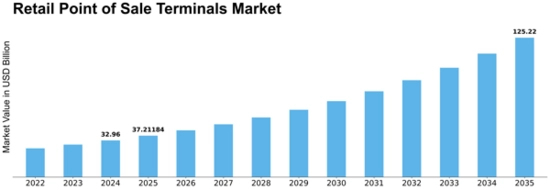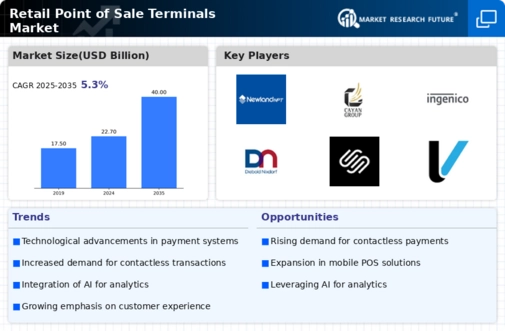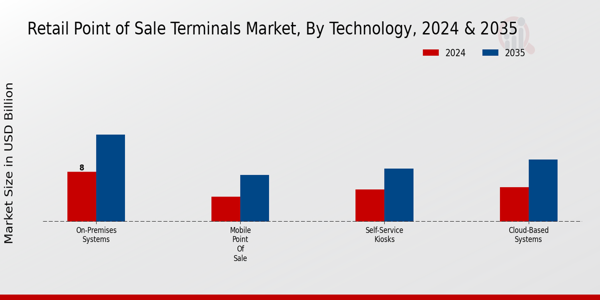-
EXECUTIVE SUMMARY
-
Key Findings
-
Market Segmentation
-
Challenges and Opportunities
-
Future
-
MARKET INTRODUCTION
-
Definition
- Research Objective
- Assumption
-
RESEARCH METHODOLOGY
-
Overview
-
Data Mining
-
Secondary Research
-
Primary Research
- Primary Interviews
- Breakdown of Primary Respondents
-
Forecasting Model
-
Market Size Estimation
- Bottom-Up
- Top-Down Approach
-
Data Triangulation
-
MARKET DYNAMICS
-
Overview
-
Restraints
-
Opportunities
-
MARKET FACTOR ANALYSIS
-
Value chain Analysis
-
Porter's Five Forces Analysis
- Bargaining Power of Buyers
- Threat of Substitutes
- Intensity
-
COVID-19 Impact Analysis
- Market Impact Analysis
- Regional Impact
- Opportunity and Threat Analysis
-
RETAIL POINT OF SALE TERMINALS MARKET, BY TECHNOLOGY (USD BILLION)
-
Cloud-Based Systems
-
On-Premises Systems
-
Mobile Point
-
Self-Service Kiosks
-
RETAIL POINT OF SALE TERMINALS MARKET,
-
Hardware
-
Software
-
Services
-
RETAIL POINT OF SALE TERMINALS MARKET, BY END USER (USD BILLION)
-
Hospitality
-
Healthcare
-
FoodBeverage
-
RETAIL POINT OF SALE TERMINALS MARKET, BY PAYMENT METHOD (USD BILLION)
-
Credit/Debit Card
-
Mobile Wallet
-
Contactless Payment
-
Cash
-
RETAIL POINT OF SALE TERMINALS MARKET, BY REGIONAL (USD
-
North America
- US
- Canada
- Germany
- UK
- France
- Italy
- Spain
- Rest of Europe
-
APAC
- China
- India
- Japan
- Malaysia
- Thailand
- Indonesia
- Rest of APAC
-
South America
- Brazil
- Argentina
- Rest of South America
-
MEA
- GCC Countries
- South Africa
- Rest of MEA
-
COMPETITIVE LANDSCAPE
-
Overview
-
Competitive Analysis
-
Market share Analysis
-
Major Growth Strategy in the Retail
-
Competitive Benchmarking
-
Key developments and growth strategies
- New Product
- Merger & Acquisitions
-
Major Players Financial Matrix
- Sales and
- Major Players R&D Expenditure. 2023
-
Bluefin Payment Systems
- Financial Overview
- Products Offered
- Key Developments
- SWOT
- Key Strategies
-
Newland Payment Technology
- Financial Overview
- Products Offered
- Key Developments
- SWOT Analysis
- Key Strategies
-
Cayan
- Products Offered
- Key Developments
- SWOT Analysis
- Key Strategies
-
Destiny Technologies
- Financial Overview
- Products Offered
- Key
- SWOT Analysis
- Key Strategies
- Financial Overview
- Products Offered
- Key Developments
- SWOT Analysis
- Key Strategies
-
Ingenico Group
- Financial Overview
- Products
- Key Developments
- SWOT Analysis
-
NCR Corporation
- Financial Overview
- Products Offered
- Key Developments
- SWOT Analysis
- Key Strategies
-
Total Merchant Services
- Financial
- Products Offered
- Key Developments
- Key Strategies
-
Ingenico
- Financial
- Products Offered
- Key Developments
- Key Strategies
-
Diebold Nixdorf
- Products Offered
- Key Developments
- SWOT Analysis
- Key Strategies
-
Square
- Financial Overview
- Products Offered
- Key
- SWOT Analysis
- Key Strategies
- Financial Overview
- Products Offered
- SWOT Analysis
- Key Strategies
-
PAX Technology
- Financial Overview
- Products
- Key Developments
- SWOT Analysis
-
Clover Network
- Financial Overview
- Products Offered
- Key Developments
- SWOT
- Key Strategies
-
Epson
- Financial
- Products Offered
- Key Developments
- Key Strategies
-
APPENDIX
-
References
-
Related Reports
-
LIST OF ASSUMPTIONS
-
NORTH AMERICA RETAIL POINT OF SALE TERMINALS MARKET SIZE ESTIMATES
-
NORTH AMERICA
-
NORTH AMERICA RETAIL POINT OF SALE TERMINALS
-
NORTH AMERICA RETAIL POINT OF SALE TERMINALS MARKET SIZE ESTIMATES &
-
NORTH AMERICA
-
US RETAIL POINT OF SALE TERMINALS MARKET
-
US RETAIL POINT OF SALE TERMINALS MARKET SIZE ESTIMATES & FORECAST, BY COMPONENT,
-
US RETAIL POINT OF SALE TERMINALS MARKET
-
US RETAIL POINT OF SALE TERMINALS MARKET SIZE ESTIMATES & FORECAST, BY PAYMENT
-
US RETAIL POINT OF SALE TERMINALS
-
CANADA RETAIL POINT OF SALE TERMINALS MARKET SIZE ESTIMATES & FORECAST,
-
CANADA RETAIL POINT OF SALE
-
CANADA RETAIL POINT OF SALE TERMINALS MARKET SIZE ESTIMATES &
-
CANADA RETAIL POINT
-
CANADA RETAIL POINT OF SALE TERMINALS MARKET SIZE
-
EUROPE RETAIL POINT OF SALE TERMINALS MARKET
-
EUROPE RETAIL POINT OF SALE TERMINALS MARKET SIZE ESTIMATES & FORECAST,
-
EUROPE RETAIL POINT OF SALE
-
EUROPE RETAIL POINT OF SALE TERMINALS MARKET SIZE ESTIMATES
-
GERMANY RETAIL
-
GERMANY RETAIL POINT OF SALE TERMINALS MARKET SIZE
-
GERMANY RETAIL POINT OF SALE
-
GERMANY RETAIL POINT OF SALE TERMINALS MARKET SIZE ESTIMATES
-
UK RETAIL
-
UK RETAIL POINT OF SALE TERMINALS MARKET SIZE ESTIMATES
-
UK RETAIL
-
UK RETAIL POINT OF SALE TERMINALS MARKET SIZE ESTIMATES
-
UK RETAIL
-
FRANCE RETAIL POINT OF SALE TERMINALS MARKET SIZE
-
FRANCE RETAIL POINT OF SALE TERMINALS MARKET
-
FRANCE RETAIL POINT OF SALE TERMINALS MARKET SIZE ESTIMATES & FORECAST,
-
FRANCE RETAIL POINT
-
RUSSIA RETAIL POINT OF SALE TERMINALS MARKET SIZE ESTIMATES
-
RUSSIA RETAIL
-
RUSSIA RETAIL POINT OF SALE TERMINALS MARKET SIZE
-
RUSSIA RETAIL POINT OF SALE TERMINALS
-
ITALY RETAIL POINT OF SALE TERMINALS MARKET SIZE ESTIMATES & FORECAST,
-
ITALY RETAIL POINT OF SALE
-
ITALY RETAIL POINT OF SALE TERMINALS MARKET SIZE ESTIMATES &
-
ITALY RETAIL POINT
-
ITALY RETAIL POINT OF SALE TERMINALS MARKET SIZE
-
SPAIN RETAIL POINT OF SALE TERMINALS MARKET
-
SPAIN RETAIL POINT OF SALE TERMINALS MARKET SIZE ESTIMATES & FORECAST, BY
-
SPAIN RETAIL POINT OF SALE TERMINALS
-
SPAIN RETAIL POINT OF SALE TERMINALS MARKET SIZE ESTIMATES &
-
REST OF EUROPE RETAIL
-
REST OF EUROPE RETAIL POINT OF SALE TERMINALS MARKET
-
REST OF EUROPE RETAIL POINT OF SALE TERMINALS MARKET SIZE ESTIMATES & FORECAST,
-
REST OF EUROPE RETAIL POINT
-
REST OF EUROPE RETAIL POINT OF SALE TERMINALS MARKET
-
APAC RETAIL POINT OF SALE TERMINALS MARKET SIZE ESTIMATES & FORECAST, BY
-
APAC RETAIL POINT OF SALE TERMINALS
-
APAC RETAIL POINT OF SALE TERMINALS MARKET SIZE ESTIMATES & FORECAST,
-
APAC RETAIL POINT OF SALE
-
APAC RETAIL POINT OF SALE TERMINALS MARKET SIZE ESTIMATES
-
CHINA RETAIL
-
CHINA RETAIL POINT OF SALE TERMINALS MARKET SIZE
-
CHINA RETAIL POINT OF SALE TERMINALS
-
CHINA RETAIL POINT OF SALE TERMINALS MARKET SIZE ESTIMATES &
-
INDIA RETAIL POINT
-
INDIA RETAIL POINT OF SALE TERMINALS MARKET SIZE
-
INDIA RETAIL POINT OF SALE TERMINALS
-
INDIA RETAIL POINT OF SALE TERMINALS MARKET SIZE ESTIMATES &
-
JAPAN RETAIL POINT
-
JAPAN RETAIL POINT OF SALE TERMINALS MARKET SIZE
-
JAPAN RETAIL POINT OF SALE TERMINALS
-
JAPAN RETAIL POINT OF SALE TERMINALS MARKET SIZE ESTIMATES &
-
SOUTH KOREA RETAIL
-
SOUTH KOREA RETAIL POINT OF SALE TERMINALS MARKET
-
SOUTH KOREA RETAIL POINT OF SALE TERMINALS MARKET SIZE ESTIMATES & FORECAST,
-
SOUTH KOREA RETAIL POINT OF
-
SOUTH KOREA RETAIL POINT OF SALE TERMINALS MARKET
-
MALAYSIA RETAIL POINT OF SALE TERMINALS MARKET SIZE ESTIMATES & FORECAST,
-
MALAYSIA RETAIL POINT OF
-
MALAYSIA RETAIL POINT OF SALE TERMINALS MARKET SIZE ESTIMATES
-
MALAYSIA RETAIL
-
MALAYSIA RETAIL POINT OF SALE TERMINALS
-
THAILAND RETAIL POINT OF SALE TERMINALS MARKET SIZE ESTIMATES &
-
THAILAND RETAIL
-
THAILAND RETAIL POINT OF SALE TERMINALS MARKET SIZE
-
THAILAND RETAIL POINT OF
-
INDONESIA RETAIL POINT OF SALE TERMINALS MARKET SIZE ESTIMATES
-
INDONESIA
-
INDONESIA RETAIL POINT OF SALE TERMINALS
-
INDONESIA RETAIL POINT OF SALE TERMINALS MARKET SIZE ESTIMATES &
-
INDONESIA
-
REST OF APAC RETAIL POINT OF SALE TERMINALS
-
REST OF APAC RETAIL POINT OF SALE TERMINALS MARKET SIZE ESTIMATES &
-
REST OF APAC RETAIL
-
REST OF APAC RETAIL POINT OF SALE TERMINALS MARKET
-
REST OF APAC RETAIL POINT OF SALE TERMINALS MARKET SIZE ESTIMATES & FORECAST,
-
SOUTH AMERICA RETAIL POINT
-
SOUTH AMERICA RETAIL POINT OF SALE TERMINALS MARKET
-
SOUTH AMERICA RETAIL POINT OF SALE TERMINALS MARKET SIZE ESTIMATES & FORECAST,
-
SOUTH AMERICA RETAIL POINT
-
SOUTH AMERICA RETAIL POINT OF SALE TERMINALS MARKET
-
BRAZIL RETAIL POINT OF SALE TERMINALS MARKET SIZE ESTIMATES & FORECAST,
-
BRAZIL RETAIL POINT OF
-
BRAZIL RETAIL POINT OF SALE TERMINALS MARKET SIZE ESTIMATES
-
BRAZIL RETAIL
-
BRAZIL RETAIL POINT OF SALE TERMINALS
-
MEXICO RETAIL POINT OF SALE TERMINALS MARKET SIZE ESTIMATES & FORECAST,
-
MEXICO RETAIL POINT OF
-
MEXICO RETAIL POINT OF SALE TERMINALS MARKET SIZE ESTIMATES
-
MEXICO RETAIL
-
MEXICO RETAIL POINT OF SALE TERMINALS
-
ARGENTINA RETAIL POINT OF SALE TERMINALS MARKET SIZE ESTIMATES &
-
ARGENTINA RETAIL
-
ARGENTINA RETAIL POINT OF SALE TERMINALS MARKET
-
ARGENTINA RETAIL POINT OF SALE TERMINALS MARKET SIZE ESTIMATES & FORECAST,
-
ARGENTINA RETAIL POINT
-
REST OF SOUTH AMERICA RETAIL POINT OF SALE TERMINALS
-
REST OF SOUTH AMERICA RETAIL POINT OF SALE TERMINALS MARKET SIZE ESTIMATES
-
REST OF
-
REST OF SOUTH AMERICA RETAIL
-
REST OF SOUTH AMERICA RETAIL POINT OF
-
MEA RETAIL POINT OF SALE TERMINALS MARKET SIZE ESTIMATES
-
MEA RETAIL
-
MEA RETAIL POINT OF SALE TERMINALS MARKET SIZE ESTIMATES
-
MEA RETAIL
-
MEA RETAIL POINT OF SALE TERMINALS MARKET
-
GCC COUNTRIES RETAIL POINT OF SALE TERMINALS MARKET SIZE ESTIMATES & FORECAST,
-
GCC COUNTRIES RETAIL POINT
-
GCC COUNTRIES RETAIL POINT OF SALE TERMINALS MARKET
-
GCC COUNTRIES RETAIL POINT OF SALE TERMINALS MARKET SIZE ESTIMATES & FORECAST,
-
GCC COUNTRIES RETAIL
-
SOUTH AFRICA RETAIL POINT OF SALE TERMINALS MARKET
-
SOUTH AFRICA RETAIL POINT OF SALE TERMINALS MARKET SIZE ESTIMATES & FORECAST,
-
SOUTH AFRICA RETAIL POINT
-
SOUTH AFRICA RETAIL POINT OF SALE TERMINALS MARKET SIZE
-
SOUTH AFRICA RETAIL POINT OF SALE TERMINALS MARKET SIZE ESTIMATES & FORECAST,
-
REST OF MEA RETAIL POINT
-
REST OF MEA RETAIL POINT OF SALE TERMINALS MARKET
-
REST OF MEA RETAIL POINT OF SALE TERMINALS MARKET SIZE ESTIMATES & FORECAST,
-
REST OF MEA RETAIL POINT
-
REST OF MEA RETAIL POINT OF SALE TERMINALS MARKET
-
PRODUCT LAUNCH/PRODUCT DEVELOPMENT/APPROVAL
-
ACQUISITION/PARTNERSHIP
-
MARKET SYNOPSIS
-
NORTH AMERICA RETAIL
-
US RETAIL POINT OF SALE
-
US RETAIL POINT OF SALE
-
US RETAIL POINT OF SALE TERMINALS
-
US RETAIL POINT OF SALE TERMINALS MARKET
-
US RETAIL POINT OF SALE TERMINALS MARKET
-
CANADA RETAIL POINT OF SALE TERMINALS MARKET
-
CANADA RETAIL POINT OF SALE TERMINALS MARKET
-
CANADA RETAIL POINT OF SALE TERMINALS MARKET
-
CANADA RETAIL POINT OF SALE TERMINALS MARKET
-
CANADA RETAIL POINT OF SALE TERMINALS
-
EUROPE RETAIL POINT OF SALE TERMINALS
-
GERMANY RETAIL POINT OF SALE TERMINALS MARKET ANALYSIS
-
GERMANY RETAIL POINT OF SALE TERMINALS MARKET ANALYSIS
-
GERMANY RETAIL POINT OF SALE TERMINALS MARKET ANALYSIS
-
GERMANY RETAIL POINT OF SALE TERMINALS MARKET ANALYSIS
-
GERMANY RETAIL POINT OF SALE TERMINALS MARKET
-
UK RETAIL POINT OF SALE TERMINALS MARKET ANALYSIS
-
UK RETAIL POINT OF SALE TERMINALS MARKET ANALYSIS
-
UK RETAIL POINT OF SALE TERMINALS MARKET ANALYSIS
-
UK RETAIL POINT OF SALE TERMINALS MARKET ANALYSIS BY
-
UK RETAIL POINT OF SALE TERMINALS MARKET ANALYSIS
-
FRANCE RETAIL POINT OF SALE TERMINALS MARKET ANALYSIS
-
FRANCE RETAIL POINT OF SALE TERMINALS MARKET ANALYSIS
-
FRANCE RETAIL POINT OF SALE TERMINALS MARKET ANALYSIS
-
FRANCE RETAIL POINT OF SALE TERMINALS MARKET ANALYSIS
-
FRANCE RETAIL POINT OF SALE TERMINALS MARKET
-
RUSSIA RETAIL POINT OF SALE TERMINALS MARKET
-
RUSSIA RETAIL POINT OF SALE TERMINALS MARKET
-
RUSSIA RETAIL POINT OF SALE TERMINALS MARKET
-
RUSSIA RETAIL POINT OF SALE TERMINALS MARKET
-
RUSSIA RETAIL POINT OF SALE TERMINALS
-
ITALY RETAIL POINT OF SALE TERMINALS
-
ITALY RETAIL POINT OF SALE TERMINALS
-
ITALY RETAIL POINT OF SALE TERMINALS
-
ITALY RETAIL POINT OF SALE TERMINALS
-
ITALY RETAIL POINT OF SALE TERMINALS
-
SPAIN RETAIL POINT OF SALE TERMINALS
-
SPAIN RETAIL POINT OF SALE TERMINALS
-
SPAIN RETAIL POINT OF SALE TERMINALS
-
SPAIN RETAIL POINT OF SALE TERMINALS
-
SPAIN RETAIL POINT OF SALE TERMINALS
-
REST OF EUROPE RETAIL POINT OF SALE
-
REST OF EUROPE RETAIL POINT
-
REST OF EUROPE RETAIL
-
REST OF EUROPE
-
APAC RETAIL POINT OF SALE TERMINALS MARKET ANALYSIS
-
CHINA RETAIL
-
CHINA RETAIL
-
CHINA RETAIL
-
CHINA RETAIL
-
CHINA
-
INDIA
-
INDIA
-
INDIA
-
INDIA
-
JAPAN RETAIL POINT OF SALE TERMINALS MARKET ANALYSIS BY COMPONENT
-
JAPAN RETAIL POINT OF SALE TERMINALS MARKET ANALYSIS BY END USER
-
JAPAN RETAIL POINT OF SALE TERMINALS MARKET ANALYSIS BY PAYMENT METHOD
-
JAPAN RETAIL POINT OF SALE TERMINALS MARKET ANALYSIS BY REGIONAL
-
SOUTH KOREA RETAIL POINT OF SALE TERMINALS MARKET ANALYSIS BY TECHNOLOGY
-
SOUTH KOREA RETAIL POINT OF SALE TERMINALS MARKET ANALYSIS BY COMPONENT
-
SOUTH KOREA RETAIL POINT OF SALE TERMINALS MARKET ANALYSIS BY END
-
SOUTH KOREA RETAIL POINT OF SALE TERMINALS MARKET ANALYSIS
-
SOUTH KOREA RETAIL POINT OF SALE TERMINALS MARKET
-
MALAYSIA RETAIL POINT OF SALE TERMINALS MARKET
-
MALAYSIA RETAIL POINT OF SALE TERMINALS
-
MALAYSIA RETAIL POINT OF SALE TERMINALS
-
MALAYSIA RETAIL POINT OF SALE TERMINALS
-
MALAYSIA RETAIL POINT OF SALE
-
THAILAND RETAIL POINT OF
-
THAILAND RETAIL POINT
-
THAILAND RETAIL
-
THAILAND RETAIL
-
THAILAND
-
INDONESIA
-
INDONESIA
-
INDONESIA
-
INDONESIA
-
REST OF APAC RETAIL POINT OF SALE TERMINALS MARKET ANALYSIS BY TECHNOLOGY
-
REST OF APAC RETAIL POINT OF SALE TERMINALS MARKET ANALYSIS BY COMPONENT
-
REST OF APAC RETAIL POINT OF SALE TERMINALS MARKET ANALYSIS BY
-
REST OF APAC RETAIL POINT OF SALE TERMINALS MARKET ANALYSIS
-
REST OF APAC RETAIL POINT OF SALE TERMINALS MARKET
-
SOUTH AMERICA RETAIL POINT OF SALE TERMINALS
-
BRAZIL RETAIL POINT OF SALE TERMINALS MARKET ANALYSIS
-
BRAZIL RETAIL POINT OF SALE TERMINALS MARKET ANALYSIS
-
BRAZIL RETAIL POINT OF SALE TERMINALS MARKET ANALYSIS
-
BRAZIL RETAIL POINT OF SALE TERMINALS MARKET ANALYSIS
-
BRAZIL RETAIL POINT OF SALE TERMINALS MARKET
-
MEXICO RETAIL POINT OF SALE TERMINALS MARKET
-
MEXICO RETAIL POINT OF SALE TERMINALS MARKET
-
MEXICO RETAIL POINT OF SALE TERMINALS MARKET
-
MEXICO RETAIL POINT OF SALE TERMINALS MARKET
-
MEXICO RETAIL POINT OF SALE TERMINALS
-
ARGENTINA RETAIL POINT OF SALE TERMINALS
-
ARGENTINA RETAIL POINT OF SALE TERMINALS
-
ARGENTINA RETAIL POINT OF SALE TERMINALS
-
ARGENTINA RETAIL POINT OF SALE TERMINALS
-
ARGENTINA RETAIL POINT OF SALE
-
REST OF SOUTH AMERICA RETAIL
-
REST OF
-
REST OF SOUTH AMERICA RETAIL POINT OF SALE TERMINALS MARKET ANALYSIS BY END
-
REST OF SOUTH AMERICA RETAIL POINT OF SALE TERMINALS MARKET
-
REST OF SOUTH AMERICA RETAIL POINT
-
MEA RETAIL POINT
-
GCC COUNTRIES RETAIL POINT OF
-
GCC COUNTRIES RETAIL
-
GCC COUNTRIES
-
GCC
-
GCC COUNTRIES RETAIL POINT OF SALE TERMINALS MARKET ANALYSIS BY REGIONAL
-
SOUTH AFRICA RETAIL POINT OF SALE TERMINALS MARKET ANALYSIS BY TECHNOLOGY
-
SOUTH AFRICA RETAIL POINT OF SALE TERMINALS MARKET ANALYSIS BY
-
SOUTH AFRICA RETAIL POINT OF SALE TERMINALS MARKET ANALYSIS
-
SOUTH AFRICA RETAIL POINT OF SALE TERMINALS MARKET
-
SOUTH AFRICA RETAIL POINT OF SALE TERMINALS
-
REST OF MEA RETAIL POINT OF SALE TERMINALS
-
REST OF MEA RETAIL POINT OF SALE
-
REST OF MEA RETAIL POINT
-
REST OF MEA RETAIL
-
REST
-
RESEARCH
-
DRO ANALYSIS OF RETAIL POINT OF SALE TERMINALS
-
DRIVERS IMPACT ANALYSIS: RETAIL POINT OF SALE TERMINALS
-
RESTRAINTS IMPACT ANALYSIS: RETAIL POINT OF SALE TERMINALS
-
SUPPLY / VALUE CHAIN: RETAIL POINT OF SALE TERMINALS MARKET
-
RETAIL POINT OF SALE TERMINALS MARKET, BY TECHNOLOGY, 2025 (%
-
RETAIL POINT OF SALE TERMINALS MARKET, BY TECHNOLOGY, 2019
-
RETAIL POINT OF SALE TERMINALS MARKET,
-
RETAIL POINT OF SALE TERMINALS MARKET,
-
RETAIL POINT OF SALE
-
RETAIL POINT OF
-
RETAIL POINT OF SALE TERMINALS MARKET, BY PAYMENT METHOD, 2019 TO 2035 (USD
-
RETAIL POINT OF SALE TERMINALS MARKET, BY REGIONAL,
-
(% SHARE)
-
RETAIL POINT OF SALE TERMINALS MARKET, BY REGIONAL,
-
TO 2035 (USD Billions)
-
BENCHMARKING OF MAJOR COMPETITORS












Leave a Comment